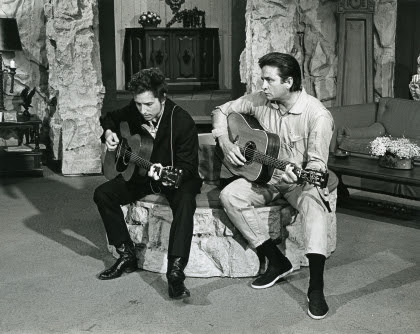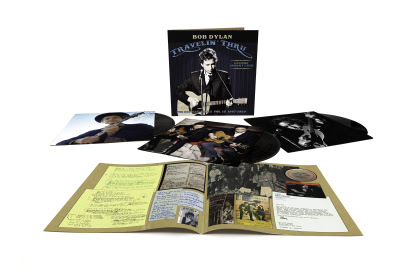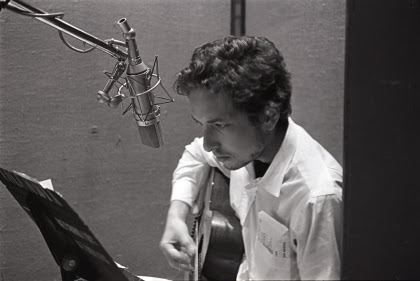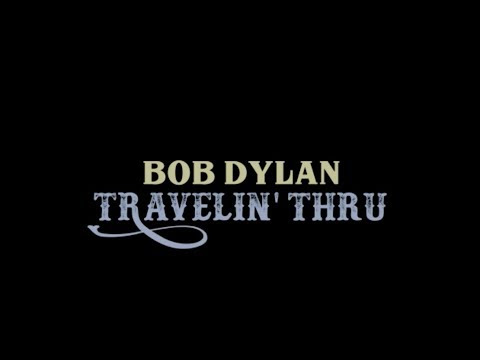
In June 1966, Bob Dylan was still putting the finishing touches on the “thin, wild mercury sound” of Blonde on Blonde, a wordy, seemingly drug-fueled rock classic loaded with impressionistic, often abstruse lyrics. The album garnered the rave reviews it deserved, but about 14 months later—having mostly recovered from a serious motorcycle accident and while many of his contemporary musicians were delving into psychedelia—he went off in a completely different direction with sessions for John Wesley Harding.
A Biblically inspired folk record that features sparse acoustic instrumentation and minimal production, it offers relatively straightforward lyrics that typically contain only a few verses and no choruses. It was as shocking upon its release as it is excellent—but not as shocking as the LP that came next: April 1969’s Nashville Skyline.
Watch the lyric video for take 2 of “Lay Lady Lay” from Travelin’ Thru
The last track on John Wesley Harding, “Down Along the Cove,” flirts with country. but on Nashville Skyline, Dylan jumps into the genre with both feet, even enlisting Johnny Cash to duet with him on a rendition of his old “Girl from the North Country.” (Cash also wrote the album’s liner notes.) The songs, all of which clock in at less than four minutes, are simple and melodious, and eschew the verbose, at times cryptic language of earlier albums in favor of traditional-sounding love lyrics.
Listen to a rehearsal of “Girl From the North Country”
Most amazing of all is Dylan’s voice, now a silky baritone. “When I stopped smoking,” he told Rolling Stone editor Jann Wenner, “my voice changed…so drastically I couldn’t believe it myself. I tell you, you stop smoking those cigarettes and you’ll be able to sing like Caruso.”
 The new Bootleg Series, Vol. 15: Travelin’ Thru, 1967-1969 focuses mostly on material from the fascinating and transformative period that produced John Wesley Harding and Nashville Skyline. A few of the 50 selections have been officially released before and many have surfaced on actual bootlegs, but the vast majority of this material has not previously appeared on any authorized albums. The package includes liner notes by singer Rosanne Cash, Johnny’s daughter, and by writer/producer Colin Escott.
The new Bootleg Series, Vol. 15: Travelin’ Thru, 1967-1969 focuses mostly on material from the fascinating and transformative period that produced John Wesley Harding and Nashville Skyline. A few of the 50 selections have been officially released before and many have surfaced on actual bootlegs, but the vast majority of this material has not previously appeared on any authorized albums. The package includes liner notes by singer Rosanne Cash, Johnny’s daughter, and by writer/producer Colin Escott.
Related: The inside story of the Nashville Skyline cover
The first of the box’s three CDs includes alternate versions of seven songs each from the John Wesley Harding and Nashville Skyline sessions, plus “Western Road,” a bluesy, derivative outtake. This material is not particularly revelatory. Numbers like “I Dreamed I Saw St. Augustine,” “All Along the Watchtower” and “Lay Lady Lay” find Dylan experimenting with altered tempos and changing a word here and there, but these tracks are not radically different from the ones that surfaced on the released LPs. You’d have to be a bit of a Dylanologist to detect the variations in some songs, such as “Drifter’s Escape,” which lacks the familiar version’s 20-second instrumental intro and incorporates slightly different phrasing of a few words.
Listen to take 4 of “I Pity the Poor Immigrant” from the box
That said, these are consistently strong performances of material from two of the most noteworthy albums of the rock era. And while the variations in these outtakes aren’t radical, you’ll likely find them interesting if you’ve been listening to John Wesley Harding and Nashville Skyline for decades.

For something truly fresh, moreover, you can turn to disc two, where Cash enters the proceedings and duets with Dylan on 19 numbers, backed by Carl Perkins and the rest of the band that also appears on Cash’s classic At San Quentin. Their rapport and mutual admiration fuel recordings that find both men in top form as vocalists.
Listen to take 1 of “Matchbox” from Travelin’ Thru
The program embraces a few of Dylan’s compositions, such as “Girl from the North Country” (two versions) and “One Too Many Mornings,” but the bulk of the duets involve numbers associated with Cash, including “I Walk the Line,” “Ring of Fire,” “Guess Things Happen That Way,” “Folsom Prison Blues” and “I Still Miss Someone.” There’s also a brief but delightful medley in which the pair combine a substantially altered version of Dylan’s “Don’t Think Twice, It’s All Right” with snippets from Cash’s “Understand Your Man.” In addition, the pair tackle Perkins’ “Matchbox” and Arthur “Big Boy” Crudup’s “That’s All Right, Mama,” as well as standards like “You Are My Sunshine” and “Careless Love.”
Related: Dylan/Cash producer Bob Johnston on the Nashville sessions
Listen to take 2 of “Tell Me That Isn’t True”
More collaborations with Cash appear on the final disc, including a pair of Jimmie Rodgers medleys where Dylan yodels. Also here: audio from his memorable appearance on the debut episode of Cash’s TV show, where he performed “I Threw It All Away” and “Living the Blues” and dueted with his host on “Girl from the North Country”; and Self-Portrait outtakes of Cash’s “Folsom Prison Blues” and “Ring of Fire.”
The dates in the album’s title notwithstanding, disc three ends with four 1970 bluegrass performances, all recorded with banjo player Earl Scruggs for Scruggs’s 1971 PBS-TV special. Among them: Dylan’s “To Be Alone with You” and “Nashville Skyline Rag,” A.P. Carter’s “East Virginia Blues” and the traditional “Honey, Just Allow Me One More Chance,” which Dylan first recorded for his 1963 Freewheelin’ album.
 Dylan’s Bootleg Series started modestly enough in 1991 but has since turned into what is arguably the most extraordinary archival project in the history of rock, thanks especially to recent blockbuster releases like The Basement Tapes Complete (2014), The Cutting Edge 1965–1966 (2015), More Blood, More Tracks (2018) and now Travelin’ Thru, 1967-1969, which would be worth buying just for the collaborations with Cash.
Dylan’s Bootleg Series started modestly enough in 1991 but has since turned into what is arguably the most extraordinary archival project in the history of rock, thanks especially to recent blockbuster releases like The Basement Tapes Complete (2014), The Cutting Edge 1965–1966 (2015), More Blood, More Tracks (2018) and now Travelin’ Thru, 1967-1969, which would be worth buying just for the collaborations with Cash.
By themselves, Dylan’s dozens of regular releases add up to a monumental catalog. But as the Bootleg Series demonstrates, there’s a whole lot more where those albums came from.
Watch ‘The Story of Travelin’ Thru, 1967-1969′
[easy_sign_up title=”Sign up for the Best Classic Bands Newsletter”]

